 As a nature lover, Summer is a joy. I love all seasons for different reasons, but not equally . I lived in the tropics for some years and Summer was stressful because of oppressive heat and torrential rain, along with hurricanes. But, having returned to Ireland several years ago, I have reclaimed my favourite memories of childhood growing up here and my love for Summer.
As a nature lover, Summer is a joy. I love all seasons for different reasons, but not equally . I lived in the tropics for some years and Summer was stressful because of oppressive heat and torrential rain, along with hurricanes. But, having returned to Ireland several years ago, I have reclaimed my favourite memories of childhood growing up here and my love for Summer. This is a busy time in MMM Templeogue, terribly busy.
This is a busy time in MMM Templeogue, terribly busy.by Sr. Sheila Campbell MMM Ireland 02.08.2025
 Embroidery on paper is a hobby that I picked up later in life. Strange, isn’t it? I think of myself as physically a bit clumsy, but at least my hands work well. I make greeting cards, and this is a useful skill in a house where the elderly Sisters keep up written contact with people in the various countries where they were in active ministry. Recently, one Sister made a comment that stayed with me for days.
Embroidery on paper is a hobby that I picked up later in life. Strange, isn’t it? I think of myself as physically a bit clumsy, but at least my hands work well. I make greeting cards, and this is a useful skill in a house where the elderly Sisters keep up written contact with people in the various countries where they were in active ministry. Recently, one Sister made a comment that stayed with me for days.
She was looking at a card I was making, admiring the pattern and the delicacy of the work. Then she turned it over to the back. This is where the threads are cut and glued together, where pattern is not so obviously, where one thread shoots across the page to start up again in another spot. Frankly, the back of the card looks messy. Eventually I put a backing on this so that the finished card hides the cut threads.
“That is exactly like our life”, said Eileen Mary. “We only see the tumble and mess, and God turns us over and sees the beautiful pattern that is out true self”. How wise, I thought. And then I realised another truth. The pattern I was making was made from small bits of thread. These are the bits that are left over from a larger pattern, but still too long to just throw away. For God, too, there are no scraps. Everything has a use in the economy of the universe. Everything forms a pattern. There are times when I cannot see the grand scale of things. I get bogged down in the messiness of everyday life.
This is when I am called to trust. Trust in God who has a wider, more loving and embracing sense of who I am and of the future of our world. Every day God encourages me to thread my needle and embroider, revealing the beauty of this world.
So today I ask for the grace to attend to the small things of life – God will make the pattern in the long run!
by Vera Grant AMMM Ireland 30.07.2025
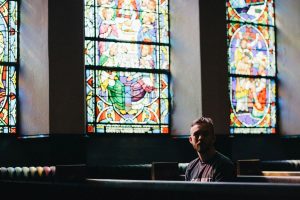 All was not quiet as I approached the doors of the church.
All was not quiet as I approached the doors of the church.
The murmur of voices reminded me of going to funerals in our local Presbyterian and Church of Ireland places of worship where everyone would be talking, not only to those beside them but also in turning to greet those sitting behind. I remembered being quite shocked the first time it happened at what seemed to be a lack of respect for God’s house.
On opening the door, I heard the parish priest talking to the sacristan who was at the far end of the church and whilst he wasn’t shouting, his voice was raised and distinctly audible. I sat down and thought, this is rather nice, it’s like going into someone’s home and there is the chatter of voices in the background. The longer I sat and listened I realised that I was on edge, I felt unsettled, I couldn’t begin to pray and my concentration was zapped.
The talking between the two didn’t last that long but long enough for me to be discomforted. In a matter of minutes, I had switched from embracing the voices to wanting for them to stop.
There have been times at the end of Mass when all are filing out and we see people slowing down to say hello to a friend. I have done the same especially when it is someone I haven’t seen in a while only to be chastened and told not to be talking in church and to go outside.
Recently there was an article in the paper about a priest, Fr Brennan who penned a poem, ‘Not I Lord surely’ on what he considered to be one of the reasons why people do not come to church. In his view it was the cold indifference and quiet disdain of the regular church goers.
It can be difficult to greet people particularly the newcomers when there is no parish centre and people appear to rush out of Mass, into their cars and drive away. At times there are a few stragglers who stand huddled in a group, ‘gossiping’ as Fr Brennan remarked in his poem. It can make others feel excluded and the newcomer remains a stranger.
In today’s gospel St Luke talks about the sisters, Martha and Mary, the former welcoming Jesus before leaving him to go and prepare something to eat. Mary instead sat with Jesus and listened to his words.
What would I have done? Hospitality takes many forms, and it is in the welcoming that we feel loved and wanted. I would have been the one preparing the meal so when Jesus said that Mary in sitting to listen chose the better role makes me think that there is room for both and a need for there to be a balance in both action and prayer. The same balance that is needed in our Church for a time to talk and a time to pray.
by Sr. Margaret Anne Meyer MMM USA 26.07.2025
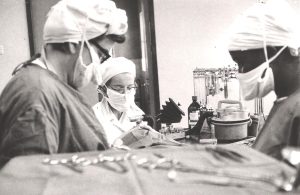 The Sisters had told me about a very frightening earthquake in their part of Tanzania that had occurred three months previously and damaged the operating theatre adjoining the outpatient’s block, rendering it unfit for surgery. Thank God the Pharmacy part of the building was safe to use and Sr. Mairead Caroll did a fantastic job of keeping us the medicines supplied. This meant regularly travelling hundreds of miles over bad roads.
The Sisters had told me about a very frightening earthquake in their part of Tanzania that had occurred three months previously and damaged the operating theatre adjoining the outpatient’s block, rendering it unfit for surgery. Thank God the Pharmacy part of the building was safe to use and Sr. Mairead Caroll did a fantastic job of keeping us the medicines supplied. This meant regularly travelling hundreds of miles over bad roads.
The female and children’s ward storage rooms were being renovated for a new theatre. Two weeks later, just when the theatre lamp had been installed, there was need to do a Caesarean Section because a patient with a prolapsed cord appeared at 3am. At first, I was hoping that the generator would not go on, but Sr. Nuala Horgan had everything in place so quickly and helped me so much that we were able to have a safe Caesarean delivery. Thank God all went well and of course the mother was delighted, too. I thanked God too for His help as I was extremely nervous.
The day before St. Patrick’s Day, we were having an informal chat about the celebrations we would enjoy with the Pallotine Fathers. Sister Christina Hanley was the sister in charge of the house and how she managed to train the cook and get food to eat in this desert area was always a sort of miracle to me. At that, Sr. Salus stormed in and said, “How can you be discussing food and parties when the male ward latrine has just caved in?” We all laughed. Nonetheless, Father Basil stepped in and said, “Do not worry about the latrine. Together with the Viwawa, young people of the parish, we will build a new latrine for the male ward patients.” He saved the day, and all the celebrations were good despite the fact he still had mud on his boots from finishing the latrine just before the party. Sr. Christina Hanley outdid herself in producing a delicious feast.
by Nadia Ramoutar MMM Communications Coordinator Ireland 23.07.2025
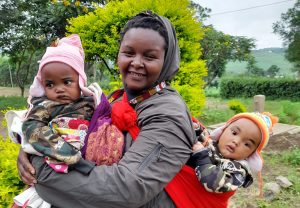 Recently a number of my friends participated in a fundraiser to make money for the Samaritans. In Ireland, this is a well-known charity that provides help to people in their darkest hours. They even have a 24/7 hotline that people can ring anytime and talk to a trained volunteer. It’s a wonderful gift to any community.
Recently a number of my friends participated in a fundraiser to make money for the Samaritans. In Ireland, this is a well-known charity that provides help to people in their darkest hours. They even have a 24/7 hotline that people can ring anytime and talk to a trained volunteer. It’s a wonderful gift to any community.
It is interesting how over many years we have come to think of the Samaritans as people who are kind and help strangers and neighbours who are in a bad situation. However, as many of you know, when Jesus told the parable of the Good Samaritan in Luke 10, at the time this was not the case. In the response to the trick question “Who is my neighbour, Jesus told the famous story of three people who saw someone in dire need and how the first two, who were supposed to be spiritual, ignored the neighbour.
It was the third person, the Samaritan, who aided the person going up and beyond the call of duty to which Jesue said “Which of these proved to be a neighbour to this man?”
It is a powerful question and one that is as timely now as it was then. At the time of this story, the Samaritans were not a popular group of people. They were disliked and the Jewish people of Galilee and Judea shunned the Samaritans. Our view of them now is totally different.
When we look at the condition of the world today, we can see that there is a lot of noise around “belonging” and who is our neighbour raises its head again. When we look at the atrocities being done globally it seems that political and spiritual boundaries are being used in horrific ways not only to divide people but to persecute them. It is difficult to stay in touch with world news without a sense of dread and anxiety.
When I visited the MMM Missions in Tanzania I was standing with the MMM Sisters at the top of a hill. I could see as the starting time for the outreach antenatal clinic was growing close. I saw women and girls coming from every direction. Some were carrying one of two babies or small children. Many were pregnant. It was a true gift to see the women coming together like a river of humanity and flowing up towards us.
What tribe the women or girls were from, or what religion they were, was not a question. They were now our “neighbours” and in need of support and care. What would it take to spread this idea again and to bring Jesus’ example back into humanity?
We are facing dark times in our world and it is time now to say, “I will be your neighbour.” No questions asked.
by Sr. Sheila Campbell MMM Ireland 19.07.2025
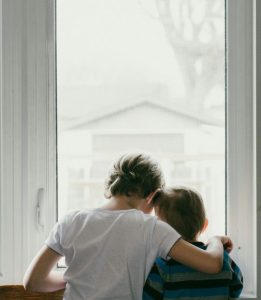 In our times we sometimes fail to take account of how we influence one another. We have all heard of “influencers” on social media platforms, but I am guessing that most of us think “I would never be influenced by anyone else!” We have such a high regard for our own autonomy!!
In our times we sometimes fail to take account of how we influence one another. We have all heard of “influencers” on social media platforms, but I am guessing that most of us think “I would never be influenced by anyone else!” We have such a high regard for our own autonomy!!
Recently I heard a story which made me think again. One of the Sisters was sharing at coffee about working with young couples who were in marital difficulties. In the culture where she was working, the custom was that the mother would feed her husband first. Then she would feed the children. Lastly, and only when she had all the chores done, she would eat herself. At the Health Centre where she worked, they had a different philosophy. They asked the couple to try a different system. They asked them to feed the children first and then sit down together to eat. Just that. They were not into therapy as in the Western world, but just a small change to help the husband and wife see each other as equal human beings, both concerned with the education and upbringing of their children.
The change was remarkable. Not alone did marriages improve, but the level of domestic violence in the society was drastically reduced.
Now, I think to myself, what small change can I make in my life patterns to produce good results like that? Recently I was reading a blog by one of our young Sisters. She was recommending acts of kindness. When you do a small act of kindness, it changes you on the inside to becoming a kinder person. It also has a ripple effect. When you notice a small act of kindness you want to reach out and do one yourself.
I remember being in Chapel one day and a Sister who was confined to a wheelchair noticed the person in front of her was cold. She inched forward until she was near enough to reach her and draped a shawl around her shoulders. That is kindness. Up to the end of her life she was thinking of others and how she could help.
So that is my challenge today – be kind, notice others’ needs, and maybe God will be kind to me and help me be a better person.
by Sr. Sheila Devane MMM Ireland 16.07.2025
 Summertime in Ireland with its long, long days brings us many opportunities: for holidays, special ceremonies, pilgrimages, outdoor activities, and riveting sports’ events either here or elsewhere and most of them available on TV.
Summertime in Ireland with its long, long days brings us many opportunities: for holidays, special ceremonies, pilgrimages, outdoor activities, and riveting sports’ events either here or elsewhere and most of them available on TV.
The annual remembrance of the dead in their graveyards is held in Drogheda in July and we MMMs decorate each sister’s grave with beautiful flowers and attend the mass and memorial service that Sunday. People come up to talk about different sisters whom they knew well and still mourn. It is also the season of the wonderful international tennis tournament at Wimbledon UK where the top world players compete for the top prizes – the Challenge Cup (men’s singles) and the Rosewater Dish (women’s singles).
I love to watch Wimbledon and look forward to the first two weeks of July each year. Little else gets done by me each afternoon! I am glued to the screen and to the matches. While watching I always feel in the presence of two now deceased, wonderful Medical Missionaries of Mary: Sisters Sheila Hogan and Eileen Carmel Keogan. Let me tell you about them!
Sister Sheila died in May 1990 and would have missed watching Wimbledon on TV that year – possibly though she was watching from Heaven? In the time I knew her she arranged her holidays for the first two weeks of July every year, went to Bettystown where she appreciated the other sister guests talk of swimming, walking on the beach and meeting up with friends – but she was virtually in Wimbledon for every match. She was a wonderful woman, a trained nurse and our first radiographer and if I am not mistaken one of the first people to train in radiography in Ireland? In the large community in Drogheda at that time she arranged monthly talks called “Our Lady’s Circle” where she brought in guest speakers on a whole variety of topics. She then called on one of us to propose a vote of thanks and another to second it –in this way we were getting experience in public speaking as well as a wealth of information on subjects that we mightn’t otherwise know anything about!
I recall talking to her about tennis; she played as a schoolgirl and later as a young woman and knew all about the best racquets, strongest non-slip shoes, most suitable clothing and as a radiographer knew too of the strains, sprains and fractures that tennis players are most vulnerable to suffering. And Sheila knew the players long before Wimbledon began as she avidly followed their careers all year. I feel her beside me and would love to hear her commentary!
Sister Eileen Carmel died in June 2011. She watched Wimbledon daily every year on one of the TVs in the big rooms in Beechgrove before its renovation. She particularly enjoyed having a companion or two watching with her and invited and encouraged us to join in. Eileen played tennis and many other sports at secondary school, and she proudly spoke of her sports’ prowess showing off a large cup which she won one year in the Dominican Convent, Cabra, where she was a boarder. She kept the cup in her small bedroom in St. Patrick’s corridor where it served as a useful receptacle for whatever small items needed housing at any time!
Eileen was a wonderful character and a force of nature. She established hospital pastoral care in Ireland and given her warm, vibrant personality and great love of life it is amazing that anyone died in her care – but they did, and they could not have had a kinder, more caring person than herself seeing them off to their gentle God. As I write this short article and watch a very uneven game of tennis where a magnificent, seeded female player is just not getting into the game at all, I can hear Eileen beside me talking of days when she too did not play her A game…. and lost.
I am truly blessed to have met these two great women, to have had the opportunity to share a hobby with them and to learn so much more from the giftedness and richness of their generous lives. May they rest in peace, and may we all continue to find creative and special ways to remember our deceased, loved ones who we still miss and to whom we owe so much.
by Sr. Jo Anne Kelly, MMM Ireland 12.07.2025
 In our mission we had a big hospital and so we also had a big community. The main house was not big enough for all of us so some sisters slept in a low small house beside it. Our dining room in the main house opened out to the garden, and outside the dining room door we had Polly, our parrot, in his cage. Polly was very popular and learnt many words from us and mostly we enjoyed him. If there was any fuss or commotion one of our sisters had a habit of saying “God save us”. She was from the North of Ireland. Polly picked up the words and the accent.
In our mission we had a big hospital and so we also had a big community. The main house was not big enough for all of us so some sisters slept in a low small house beside it. Our dining room in the main house opened out to the garden, and outside the dining room door we had Polly, our parrot, in his cage. Polly was very popular and learnt many words from us and mostly we enjoyed him. If there was any fuss or commotion one of our sisters had a habit of saying “God save us”. She was from the North of Ireland. Polly picked up the words and the accent.
Polly also picked up sounds. From his perch he could hear the bathroom toilet flushing upstairs. He learnt to copy the sound. In the beginning we thought it funny but one day we had special visitors in for dinner and Polly began flushing over and over again. So Polly got moved to outside the smaller house.
In that house there was one big room which we used as library and also sitting room. We had some good books there accumulated over the years and some other small treasures. We also had a gramophone and a selection of long playing records, also gathered up over the years. . The sister who was most often on call at night slept in the bedroom next to the library. I will call her Brigid. She was accustomed to being called any hour of the night especially to the maternity hospital.
One morning at 2am Brigid was woken up with a flashlight in her face and a man pointing a gun at her. He said “Don’t shout or I will kill you” She was so terrified that she jumped up screaming and shouting at the top of her voice, screaming so hysterically that she frightened the man. As she made for the door, he fled through the library and out through the window he had broken to get in. Brigid came out still screaming. Once out, we in the big house heard her and rushed down. Night staff from the hospital also came. When she settled somehow we went to the dining room and made tea and talked and talked.
Later we went over to see what happened. Outside, under the broken window was a bag of books and records and other things ready to be carried away. The man had got away as fast as he could and, in fact, we lost nothing except the window glass. He couldn’t have been a very serious robber, maybe hungry or in need.
However, since someone had kindly called the police, there had to be an investigation. So next morning a big crowd gathered outside the small house, some officials, many to sympathize, others just out of curiosity and everybody wanted to hear everything. The talk and discussions went on for ages as new people arrived.
Eventually one man decided to make a speech. There was a lull in the conversation and a few of us who were standing near the door, heard Polly, saying in his best Northern accent .”God save us”
by Sr. Margaret Anne Meyer MMM USA 09.07.2025
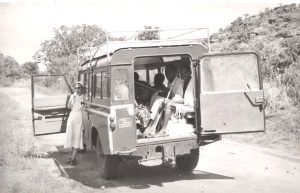 It was with boundless joy that I met Sr. Kay Lawlor when I landed in Tanzania, and she kindly gave me such a warm welcome that all the trauma of the trip was soon forgotten. The next day was March 1st, 1978, and we had a big celebration for the two postulants, Protegia Peter Slaa and Lydia Kijuu. We had ice cream, and I thanked God for them and the grace to start a new mission after 22 years on my date of entrance to MMM, March 1st, 1956.
It was with boundless joy that I met Sr. Kay Lawlor when I landed in Tanzania, and she kindly gave me such a warm welcome that all the trauma of the trip was soon forgotten. The next day was March 1st, 1978, and we had a big celebration for the two postulants, Protegia Peter Slaa and Lydia Kijuu. We had ice cream, and I thanked God for them and the grace to start a new mission after 22 years on my date of entrance to MMM, March 1st, 1956.
After a few days, we travelled to Makiungu. I never saw so many cattails in my life. All the fields were covered by them. I soon learned that this was the local food and that it was called millet. The area was a semi desert place with little rainfall. Millet thrived here and was rich in protein. It was not necessary to eat beans with it. God is incredibly wise in directing what food the people should eat according to the local reality.
The Community welcomed me with open arms. They were happy that someone had come to relieve Sr. Doctor Genevieve Van Waesberghe to return to Drogheda to write the Constitutions. Sr. Genevieve was a great help in showing me the routine of the hospital work. The hospital had one hundred beds and was situated twenty miles from the Regional Government Hospital in Singida. A bus full of patients used to travel out daily for an outpatients visit. Thank God we had good medical assistants who could see and prescribe for the vast majority of the patients and save the more difficult ones for the doctor to see. At that time there was only one doctor doing the general medical work. Sister Doctor Salus Linde specialized in tuberculosis and Leprosy. I learned a lot about these diseases from her. In Uganda we were not allowed to treat these conditions but had to send them to specialist centres. I remember seeing one man who had no fingers able to dress himself and say the rosary on an exceptionally large wooden rosary which was almost as big as himself.
It was a bit difficult for me to live with my previous novice mistress, who was now the Hospital Administrator. I thought she would be judging me all the time. It was my custom not to keep things in but to tell someone, so I prayed for guidance in how to do this. Sr. Margaret O’Conor was so gracious in this matter. She said those days are over and you have come a long way. Let’s get on with it. I was very relieved and was incredibly grateful to her and we became good friends.
